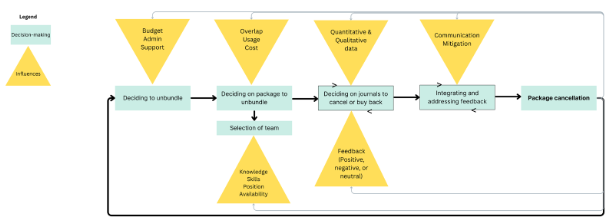Citation
Cassady, S., Hare, M., Mongeon, P., & Johnson, C. (2025). Big Deal Cancellations and Influences on Librarian Decision-Making. Canadian Journal of Academic Librarianship, 11, 1–33. https://doi.org/10.33137/cjal-rcbu.v11.43905
Abstract
Big Deals initially emerged as cost-saving purchasing models through which academic libraries could quickly grow their collections. Over time, the soaring costs of journal bundles have strained library budgets, and librarians have worked to transition away from Big Deals. Cancellation projects are complex processes involving a large amount of time and labour. Past research has examined how librarians use quantitative and/or qualitative data to make decisions around cancellations, but few go inside the process to understand the subjective factors influencing librarians’ choices. This study investigates the decision-making practices and processes of librarians concerned with the cancellation of Big Deals through interviews conducted at four medium-sized Canadian institutions that underwent cancellation projects from 2015 to 2020. The institutions investigated in this study adopted similar practices in deciding what packages to unbundle and selecting their teams. Differences in how qualitative and quantitative data were used in forming analyses, and the communication methods to counteract opposition heavily influenced the relative success of each library. Libraries seemed most successful if they could perform nuanced and complex data analyses, involved their Liaison librarians in faculty consultations, had the strong support of administrators, and wrapped the project together with an integrated communications plan. A model describing the decision-making steps in the process of unbundling journal packages and the influences that impact each step is presented, followed by recommendations for engaging with each influencing factor, based on the findings of this study.
Key figures
